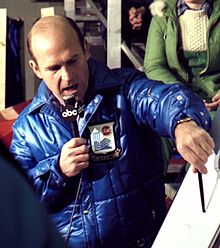
Back ديك بوتون ARZ دیک باتون AZB Dick Button Czech Richard Button German Dick Button Spanish دیک باتون Persian Dick Button Finnish Dick Button French Դիկ Բաթթոն Armenian Dick Button Italian
| Dick Button | |||||||||||||||||||||||||||||||||||||||||||||||||||||||||
|---|---|---|---|---|---|---|---|---|---|---|---|---|---|---|---|---|---|---|---|---|---|---|---|---|---|---|---|---|---|---|---|---|---|---|---|---|---|---|---|---|---|---|---|---|---|---|---|---|---|---|---|---|---|---|---|---|---|
 Button as a commentator at the 1980 Winter Olympics in Lake Placid | |||||||||||||||||||||||||||||||||||||||||||||||||||||||||
| Full name | Richard Totten Button | ||||||||||||||||||||||||||||||||||||||||||||||||||||||||
| Born | July 18, 1929 Englewood, New Jersey, U.S. | ||||||||||||||||||||||||||||||||||||||||||||||||||||||||
| Figure skating career | |||||||||||||||||||||||||||||||||||||||||||||||||||||||||
| Country | |||||||||||||||||||||||||||||||||||||||||||||||||||||||||
| Skating club | SC of Boston Philadelphia SC & HS | ||||||||||||||||||||||||||||||||||||||||||||||||||||||||
| Retired | 1952 | ||||||||||||||||||||||||||||||||||||||||||||||||||||||||
Medal record
| |||||||||||||||||||||||||||||||||||||||||||||||||||||||||
Preview warning: Page using Template:Infobox figure skater with unknown parameter "formercoach"
Richard Totten Button (born July 18, 1929)[1] is an American former figure skater and skating analyst. He was a two-time Olympic champion (1948, 1952) and five-time consecutive World champion (1948–1952). He was also the only non-European man to have become European champion. Button is credited as having been the first skater to successfully land the double Axel jump in competition in 1948, as well as the first triple jump of any kind – a triple loop – in 1952. He also invented the flying camel spin, which was originally known as the "Button camel".[2] He "brought increased athleticism" to figure skating in the years following World War II.[3]
- ^ "Famous birthdays for July 18: Vin Diesel, Kristen Bell". United Press International. July 18, 2019. Archived from the original on July 19, 2019. Retrieved August 7, 2019.
Gold medal ice skater Dick Button in 1929 (age 90)
- ^ Cite error: The named reference
onskateswas invoked but never defined (see the help page). - ^ Kestnbaum, Ellyn (2003). Culture on Ice: Figure Skating and Cultural Meaning. Middleton, Connecticut: Wesleyan Publishing Press. p. 108. ISBN 0-8195-6641-1.
© MMXXIII Rich X Search. We shall prevail. All rights reserved. Rich X Search